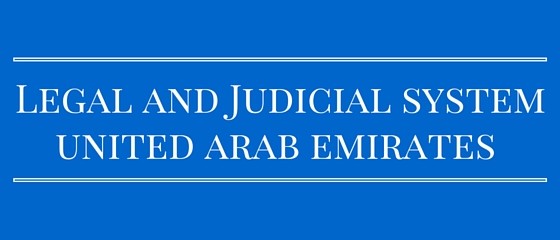Recently, the UAE (United Arab Emirates) celebrated its 44th National Day (Independence Day) with much fervor.
On this occasion I thought of exploring a bit about the formation of the UAE, and its legal and judicial system.
UAE Federation
The UAE is a Federation established in 1971 in the area previously known as the Trucial Coast in the Arabian Gulf.
Seven Emirates (Abu Dhabi, Dubai, Sharjah, Ajman, Umm Al Quwain, Ras Al-Khaimah and Fujairah) formed the UAE.
The UAE, as a federation of seven Emirates, is governed by its Constitution which provides a legal and political framework for the operation of the UAE.
The Constitution (provisional) came into effect on 2 December 1971 and was permanently accepted in May 1996.
The Constitution provides for a certain distribution of legislative powers between the federation and the individual Emirates.
According to the Constitution, certain matters are vested exclusively with the federation as regards their enactment and implementation, while others are left to the individual Emirates to implement.
The federal laws have supremacy over the laws of the individual Emirates.
However, the individual Emirates are permitted to enact their own legislation in matters that are not exclusive to the federation, as well as in those matters in relation to which – albeit exclusive to the federation – the federation has not yet exercised its legislative powers.
The UAE follows civil law system
The United Arab Emirates is essentially a civil law jurisdiction heavily influenced by French, Roman, Egyptian and Islamic law.
Common law principles, such as adopting previous court judgments as legal precedents, are generally not recognized.
However, affirmation by the UAE Supreme Court of lower courts’ rulings generally results in the formation of established principles that provide reliable guidance on the judiciary’s approach in future cases.
Judicial Structure
Being a federation, the UAE legal system is governed by the UAE Federal Constitution.
Under the Constitution, each Emirate is allowed to either establish its own judiciary or to merge with the federal court system.
As a result, there is a combination of federal and local (or Emirate) courts in the UAE with parallel jurisdictions, depending on which system the individual Emirate has opted for.
The judicial systems of most of the Emirates – except for Dubai, Ras Al-Khaimah and Abu Dhabi, which have retained their own distinct and autonomous local judicial systems – have merged into the UAE Federal Judicial Authority.
This means that essentially there are four judicial authorities in the UAE: Abu Dhabi, Dubai, Ras Al Khaimah and the Federal judicial authority covering Sharjah, Fujairah, Umm al-Quwain, and Ajman.
Abu Dhabi also contains Federal Courts but these are only used in limited circumstances.
Both Emirate and federal courts are competent to apply UAE federal laws, as well as laws and regulations promulgated by the rulers of various Emirates, provided that they properly govern the underlying civil or commercial transaction.
Federal Court System
The UAE federal system, in terms of judicial hierarchy, is divided into courts of first instance (trial court), courts of appeal and court of cassation (Supreme Court).
The UAE Federal Supreme Court, seated in Abu Dhabi, is the highest court in the federal judicial system.
This Court is also commonly referred to as the UAE Supreme Court of Cassation.
The courts of appeal in each separate judicial system seated in the individual Emirates hear appeals on rulings from the lower courts of their home Emirate.
The Federal Supreme Court has jurisdiction to adjudicate in the following matters:
- Disputes among member emirates in the federation, or among any emirate or more and the federal government.
- Examining the constitutional status of federal laws. Examining the constitutional status of the legislations, if contested by one of the federal authorities, for violating the federation constitution, or the federal laws.
- Examination of the constitution, legislations in general.
- Interpretation of the provisions of the constitution if such is requested by one of the authorities of the federation or the government of one of the emirates.
- Investigating with ministers and senior officials of the federation in accordance with the laws.
- Crimes that directly affect the interests of the federation such as internal and external security, crimes of forgery of documents or official seals of one of the federal authorities and the crimes of currency forgery.
- Jurisdiction interference between the federal judiciary and the local judicial institutions in the emirates.
- Jurisdiction interference between the judicial entity at one of the emirates and entity in another emirate.
- Any other jurisdictions mentioned in UAE Constitution or referred to upon in a federal law.
In addition, the federal courts are competent to adjudicate disputes as mentioned in Article 102 of the Constitution and all other disputes in the emirates which do not have their own judicial system.
State (or Emirate) Court System
The State judicial system (which exists only in some Emirates) is also divided into courts of first instance (trial court), courts of appeal and courts of cassation.
The State judicial systems of the Emirates of Dubai, Abu Dhabi and Ras Al-Khaimah have their own courts of cassation, entirely separate and distinct from the UAE Federal Supreme Court of Cassation.
The State judicial system have jurisdiction to adjudicate all the disputes in the concerned emirate except which is reserved for federal courts.






